Company Report: Evaluating ALDI's Strategy in Australian Market
VerifiedAdded on 2023/03/23
|9
|1760
|79
Report
AI Summary
This report provides an overview of ALDI's presence in the Australian retail market, where it competes with major players like Woolworths and Coles. It identifies ALDI's strengths as its low pricing and market expansion strategies, which have allowed it to gain a significant market share. However, the report also points out ALDI's weakness in technology compared to its competitors, which impacts customer experience and online sales. The report recommends that ALDI invest in improving its technology, enhancing customer service, and exploring online sales channels to further strengthen its market position and competitiveness in the face of increasing competition from both established and emerging retail players. Desklib provides access to similar reports and study resources for students.
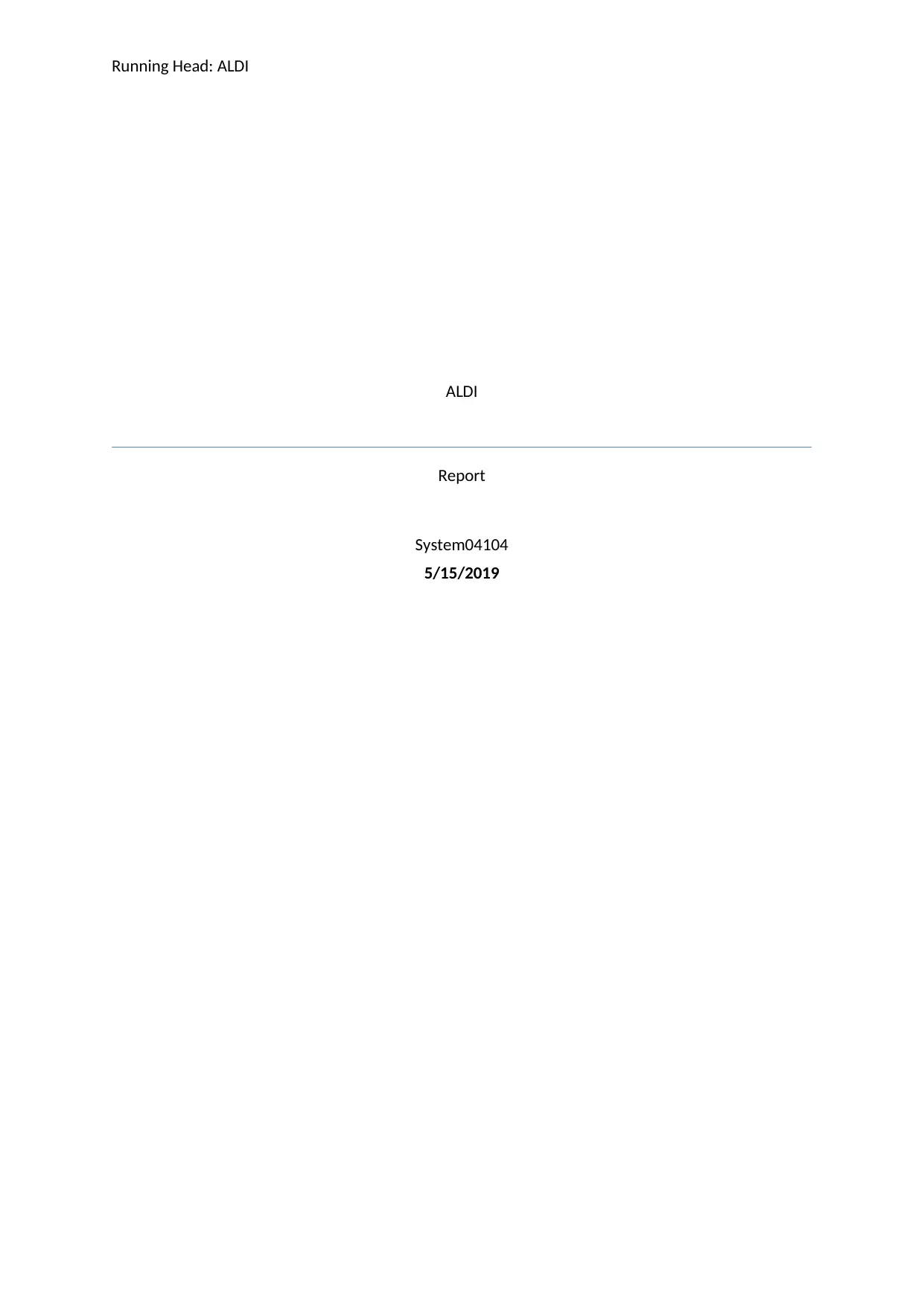
Running Head: ALDI
ALDI
Report
System04104
5/15/2019
ALDI
Report
System04104
5/15/2019
Paraphrase This Document
Need a fresh take? Get an instant paraphrase of this document with our AI Paraphraser
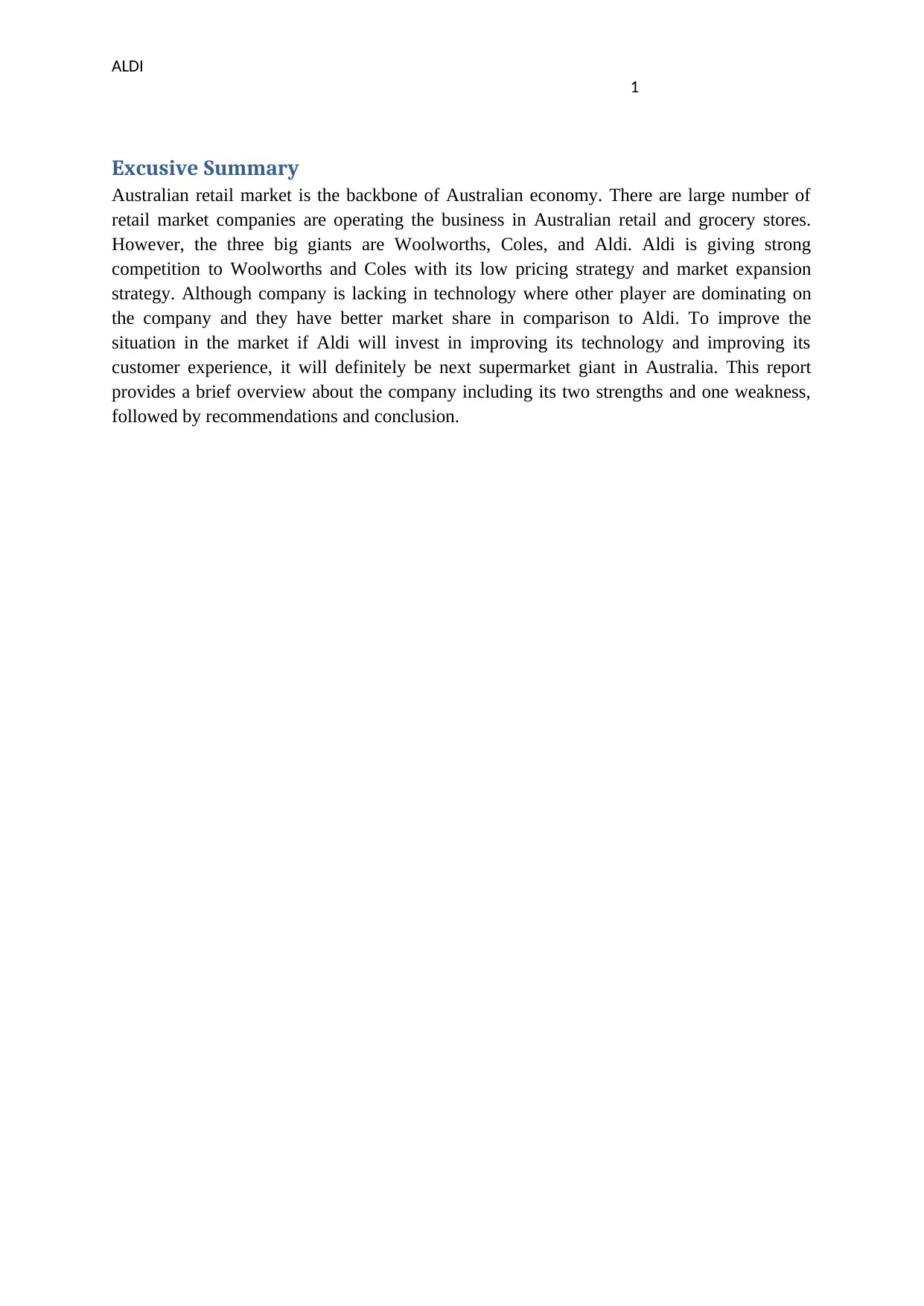
ALDI
1
Excusive Summary
Australian retail market is the backbone of Australian economy. There are large number of
retail market companies are operating the business in Australian retail and grocery stores.
However, the three big giants are Woolworths, Coles, and Aldi. Aldi is giving strong
competition to Woolworths and Coles with its low pricing strategy and market expansion
strategy. Although company is lacking in technology where other player are dominating on
the company and they have better market share in comparison to Aldi. To improve the
situation in the market if Aldi will invest in improving its technology and improving its
customer experience, it will definitely be next supermarket giant in Australia. This report
provides a brief overview about the company including its two strengths and one weakness,
followed by recommendations and conclusion.
1
Excusive Summary
Australian retail market is the backbone of Australian economy. There are large number of
retail market companies are operating the business in Australian retail and grocery stores.
However, the three big giants are Woolworths, Coles, and Aldi. Aldi is giving strong
competition to Woolworths and Coles with its low pricing strategy and market expansion
strategy. Although company is lacking in technology where other player are dominating on
the company and they have better market share in comparison to Aldi. To improve the
situation in the market if Aldi will invest in improving its technology and improving its
customer experience, it will definitely be next supermarket giant in Australia. This report
provides a brief overview about the company including its two strengths and one weakness,
followed by recommendations and conclusion.
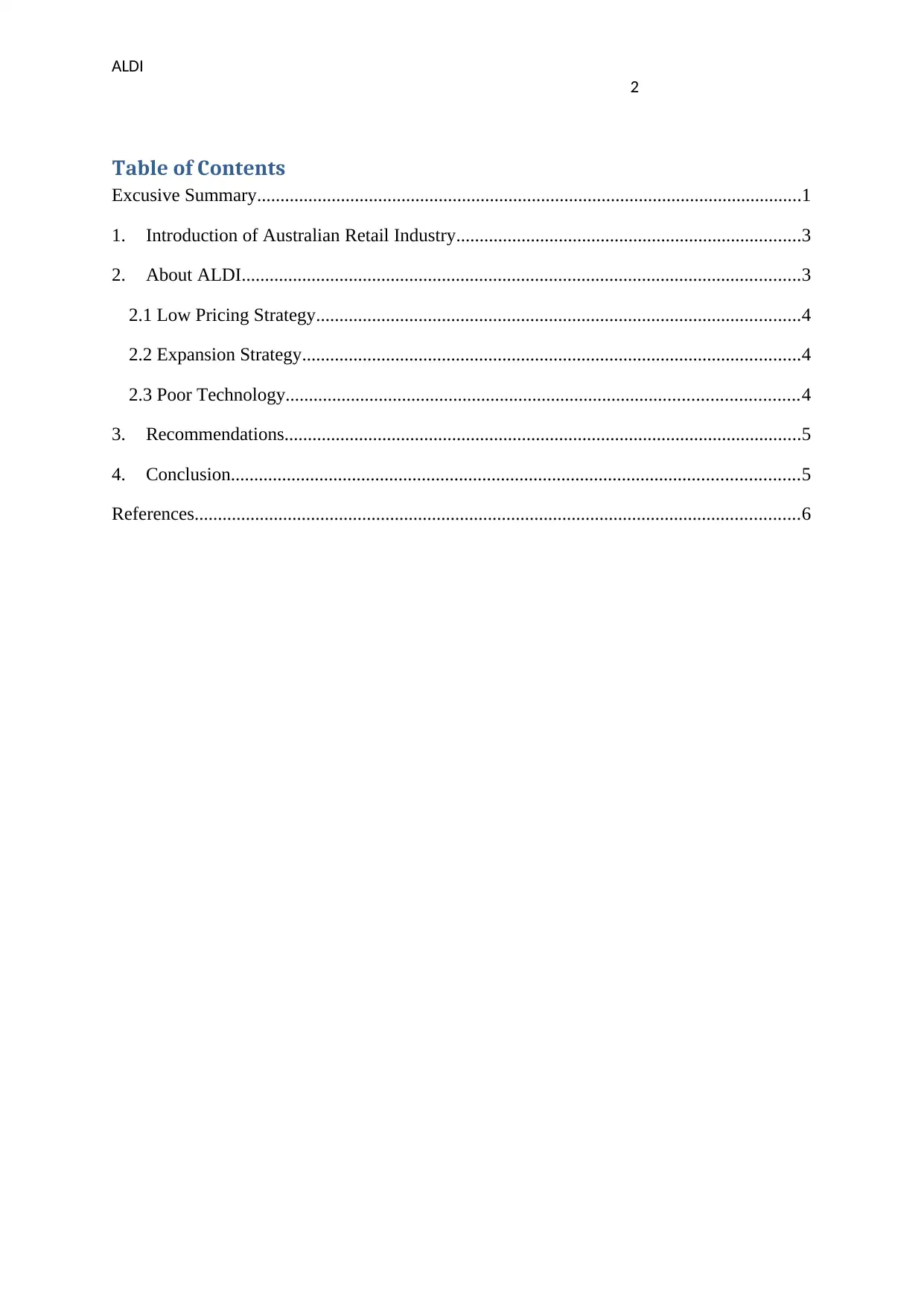
ALDI
2
Table of Contents
Excusive Summary.....................................................................................................................1
1. Introduction of Australian Retail Industry..........................................................................3
2. About ALDI........................................................................................................................3
2.1 Low Pricing Strategy........................................................................................................4
2.2 Expansion Strategy...........................................................................................................4
2.3 Poor Technology..............................................................................................................4
3. Recommendations...............................................................................................................5
4. Conclusion..........................................................................................................................5
References..................................................................................................................................6
2
Table of Contents
Excusive Summary.....................................................................................................................1
1. Introduction of Australian Retail Industry..........................................................................3
2. About ALDI........................................................................................................................3
2.1 Low Pricing Strategy........................................................................................................4
2.2 Expansion Strategy...........................................................................................................4
2.3 Poor Technology..............................................................................................................4
3. Recommendations...............................................................................................................5
4. Conclusion..........................................................................................................................5
References..................................................................................................................................6
⊘ This is a preview!⊘
Do you want full access?
Subscribe today to unlock all pages.

Trusted by 1+ million students worldwide
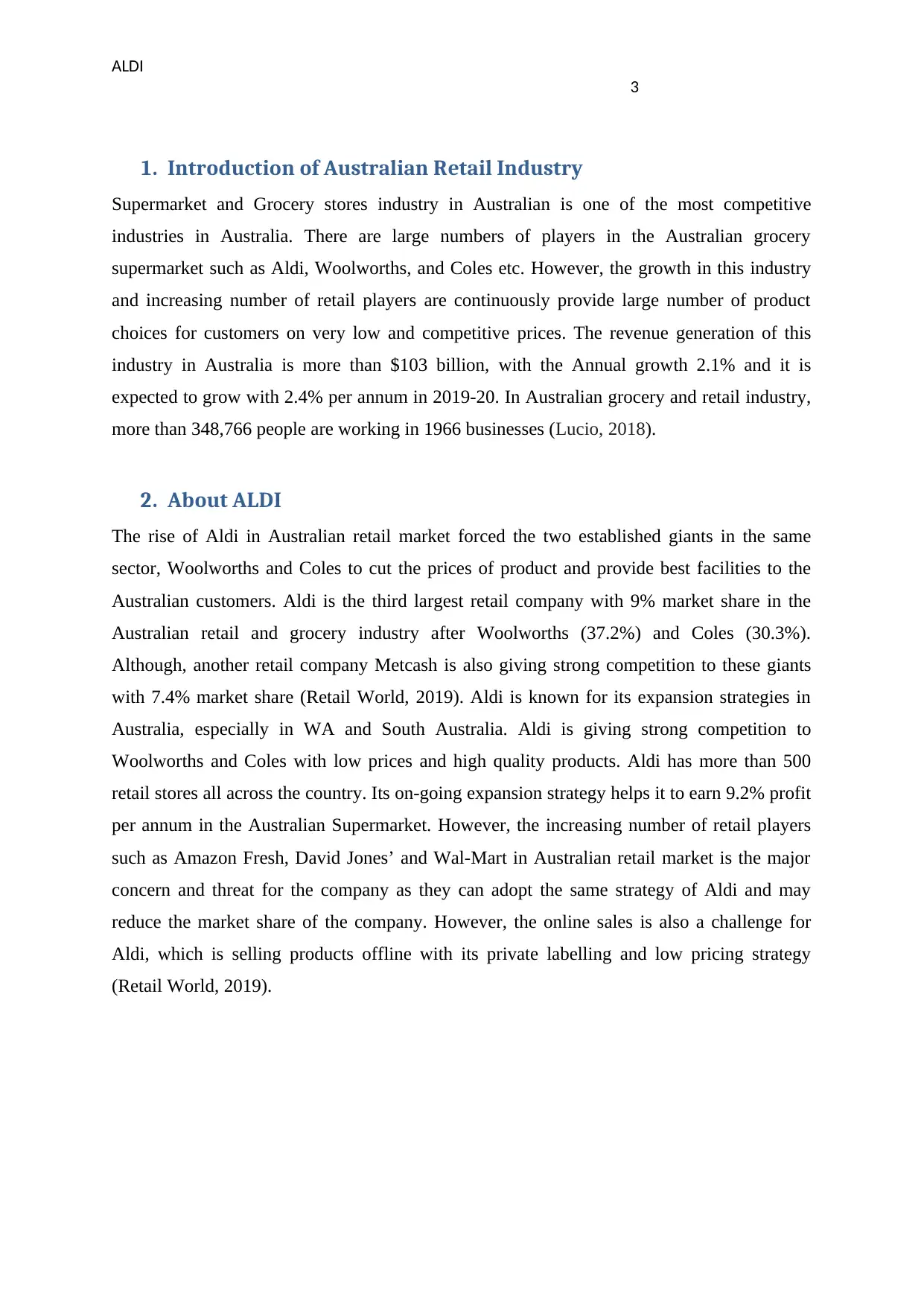
ALDI
3
1. Introduction of Australian Retail Industry
Supermarket and Grocery stores industry in Australian is one of the most competitive
industries in Australia. There are large numbers of players in the Australian grocery
supermarket such as Aldi, Woolworths, and Coles etc. However, the growth in this industry
and increasing number of retail players are continuously provide large number of product
choices for customers on very low and competitive prices. The revenue generation of this
industry in Australia is more than $103 billion, with the Annual growth 2.1% and it is
expected to grow with 2.4% per annum in 2019-20. In Australian grocery and retail industry,
more than 348,766 people are working in 1966 businesses (Lucio, 2018).
2. About ALDI
The rise of Aldi in Australian retail market forced the two established giants in the same
sector, Woolworths and Coles to cut the prices of product and provide best facilities to the
Australian customers. Aldi is the third largest retail company with 9% market share in the
Australian retail and grocery industry after Woolworths (37.2%) and Coles (30.3%).
Although, another retail company Metcash is also giving strong competition to these giants
with 7.4% market share (Retail World, 2019). Aldi is known for its expansion strategies in
Australia, especially in WA and South Australia. Aldi is giving strong competition to
Woolworths and Coles with low prices and high quality products. Aldi has more than 500
retail stores all across the country. Its on-going expansion strategy helps it to earn 9.2% profit
per annum in the Australian Supermarket. However, the increasing number of retail players
such as Amazon Fresh, David Jones’ and Wal-Mart in Australian retail market is the major
concern and threat for the company as they can adopt the same strategy of Aldi and may
reduce the market share of the company. However, the online sales is also a challenge for
Aldi, which is selling products offline with its private labelling and low pricing strategy
(Retail World, 2019).
3
1. Introduction of Australian Retail Industry
Supermarket and Grocery stores industry in Australian is one of the most competitive
industries in Australia. There are large numbers of players in the Australian grocery
supermarket such as Aldi, Woolworths, and Coles etc. However, the growth in this industry
and increasing number of retail players are continuously provide large number of product
choices for customers on very low and competitive prices. The revenue generation of this
industry in Australia is more than $103 billion, with the Annual growth 2.1% and it is
expected to grow with 2.4% per annum in 2019-20. In Australian grocery and retail industry,
more than 348,766 people are working in 1966 businesses (Lucio, 2018).
2. About ALDI
The rise of Aldi in Australian retail market forced the two established giants in the same
sector, Woolworths and Coles to cut the prices of product and provide best facilities to the
Australian customers. Aldi is the third largest retail company with 9% market share in the
Australian retail and grocery industry after Woolworths (37.2%) and Coles (30.3%).
Although, another retail company Metcash is also giving strong competition to these giants
with 7.4% market share (Retail World, 2019). Aldi is known for its expansion strategies in
Australia, especially in WA and South Australia. Aldi is giving strong competition to
Woolworths and Coles with low prices and high quality products. Aldi has more than 500
retail stores all across the country. Its on-going expansion strategy helps it to earn 9.2% profit
per annum in the Australian Supermarket. However, the increasing number of retail players
such as Amazon Fresh, David Jones’ and Wal-Mart in Australian retail market is the major
concern and threat for the company as they can adopt the same strategy of Aldi and may
reduce the market share of the company. However, the online sales is also a challenge for
Aldi, which is selling products offline with its private labelling and low pricing strategy
(Retail World, 2019).
Paraphrase This Document
Need a fresh take? Get an instant paraphrase of this document with our AI Paraphraser
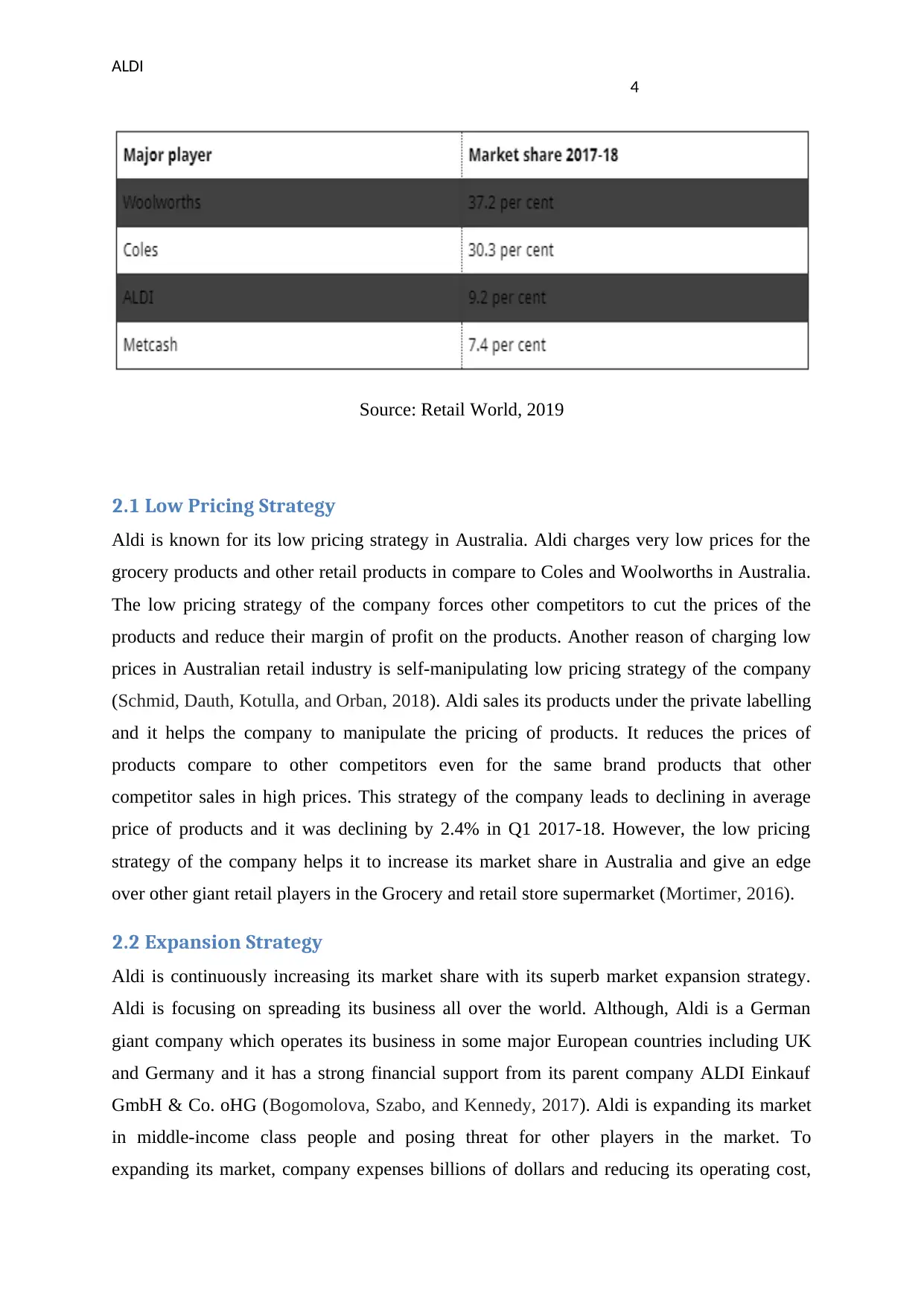
ALDI
4
Source: Retail World, 2019
2.1 Low Pricing Strategy
Aldi is known for its low pricing strategy in Australia. Aldi charges very low prices for the
grocery products and other retail products in compare to Coles and Woolworths in Australia.
The low pricing strategy of the company forces other competitors to cut the prices of the
products and reduce their margin of profit on the products. Another reason of charging low
prices in Australian retail industry is self-manipulating low pricing strategy of the company
(Schmid, Dauth, Kotulla, and Orban, 2018). Aldi sales its products under the private labelling
and it helps the company to manipulate the pricing of products. It reduces the prices of
products compare to other competitors even for the same brand products that other
competitor sales in high prices. This strategy of the company leads to declining in average
price of products and it was declining by 2.4% in Q1 2017-18. However, the low pricing
strategy of the company helps it to increase its market share in Australia and give an edge
over other giant retail players in the Grocery and retail store supermarket (Mortimer, 2016).
2.2 Expansion Strategy
Aldi is continuously increasing its market share with its superb market expansion strategy.
Aldi is focusing on spreading its business all over the world. Although, Aldi is a German
giant company which operates its business in some major European countries including UK
and Germany and it has a strong financial support from its parent company ALDI Einkauf
GmbH & Co. oHG (Bogomolova, Szabo, and Kennedy, 2017). Aldi is expanding its market
in middle-income class people and posing threat for other players in the market. To
expanding its market, company expenses billions of dollars and reducing its operating cost,
4
Source: Retail World, 2019
2.1 Low Pricing Strategy
Aldi is known for its low pricing strategy in Australia. Aldi charges very low prices for the
grocery products and other retail products in compare to Coles and Woolworths in Australia.
The low pricing strategy of the company forces other competitors to cut the prices of the
products and reduce their margin of profit on the products. Another reason of charging low
prices in Australian retail industry is self-manipulating low pricing strategy of the company
(Schmid, Dauth, Kotulla, and Orban, 2018). Aldi sales its products under the private labelling
and it helps the company to manipulate the pricing of products. It reduces the prices of
products compare to other competitors even for the same brand products that other
competitor sales in high prices. This strategy of the company leads to declining in average
price of products and it was declining by 2.4% in Q1 2017-18. However, the low pricing
strategy of the company helps it to increase its market share in Australia and give an edge
over other giant retail players in the Grocery and retail store supermarket (Mortimer, 2016).
2.2 Expansion Strategy
Aldi is continuously increasing its market share with its superb market expansion strategy.
Aldi is focusing on spreading its business all over the world. Although, Aldi is a German
giant company which operates its business in some major European countries including UK
and Germany and it has a strong financial support from its parent company ALDI Einkauf
GmbH & Co. oHG (Bogomolova, Szabo, and Kennedy, 2017). Aldi is expanding its market
in middle-income class people and posing threat for other players in the market. To
expanding its market, company expenses billions of dollars and reducing its operating cost,
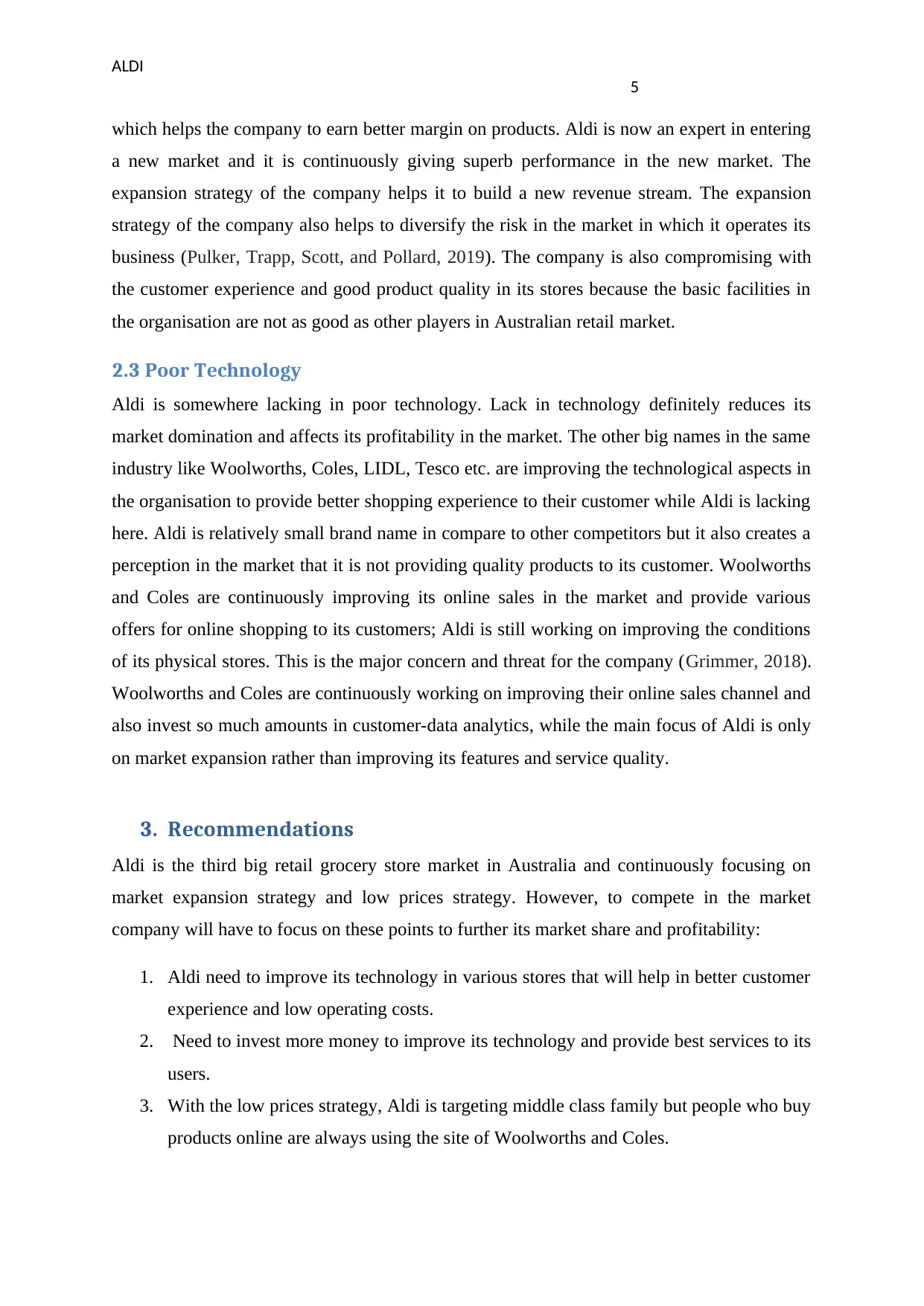
ALDI
5
which helps the company to earn better margin on products. Aldi is now an expert in entering
a new market and it is continuously giving superb performance in the new market. The
expansion strategy of the company helps it to build a new revenue stream. The expansion
strategy of the company also helps to diversify the risk in the market in which it operates its
business (Pulker, Trapp, Scott, and Pollard, 2019). The company is also compromising with
the customer experience and good product quality in its stores because the basic facilities in
the organisation are not as good as other players in Australian retail market.
2.3 Poor Technology
Aldi is somewhere lacking in poor technology. Lack in technology definitely reduces its
market domination and affects its profitability in the market. The other big names in the same
industry like Woolworths, Coles, LIDL, Tesco etc. are improving the technological aspects in
the organisation to provide better shopping experience to their customer while Aldi is lacking
here. Aldi is relatively small brand name in compare to other competitors but it also creates a
perception in the market that it is not providing quality products to its customer. Woolworths
and Coles are continuously improving its online sales in the market and provide various
offers for online shopping to its customers; Aldi is still working on improving the conditions
of its physical stores. This is the major concern and threat for the company (Grimmer, 2018).
Woolworths and Coles are continuously working on improving their online sales channel and
also invest so much amounts in customer-data analytics, while the main focus of Aldi is only
on market expansion rather than improving its features and service quality.
3. Recommendations
Aldi is the third big retail grocery store market in Australia and continuously focusing on
market expansion strategy and low prices strategy. However, to compete in the market
company will have to focus on these points to further its market share and profitability:
1. Aldi need to improve its technology in various stores that will help in better customer
experience and low operating costs.
2. Need to invest more money to improve its technology and provide best services to its
users.
3. With the low prices strategy, Aldi is targeting middle class family but people who buy
products online are always using the site of Woolworths and Coles.
5
which helps the company to earn better margin on products. Aldi is now an expert in entering
a new market and it is continuously giving superb performance in the new market. The
expansion strategy of the company helps it to build a new revenue stream. The expansion
strategy of the company also helps to diversify the risk in the market in which it operates its
business (Pulker, Trapp, Scott, and Pollard, 2019). The company is also compromising with
the customer experience and good product quality in its stores because the basic facilities in
the organisation are not as good as other players in Australian retail market.
2.3 Poor Technology
Aldi is somewhere lacking in poor technology. Lack in technology definitely reduces its
market domination and affects its profitability in the market. The other big names in the same
industry like Woolworths, Coles, LIDL, Tesco etc. are improving the technological aspects in
the organisation to provide better shopping experience to their customer while Aldi is lacking
here. Aldi is relatively small brand name in compare to other competitors but it also creates a
perception in the market that it is not providing quality products to its customer. Woolworths
and Coles are continuously improving its online sales in the market and provide various
offers for online shopping to its customers; Aldi is still working on improving the conditions
of its physical stores. This is the major concern and threat for the company (Grimmer, 2018).
Woolworths and Coles are continuously working on improving their online sales channel and
also invest so much amounts in customer-data analytics, while the main focus of Aldi is only
on market expansion rather than improving its features and service quality.
3. Recommendations
Aldi is the third big retail grocery store market in Australia and continuously focusing on
market expansion strategy and low prices strategy. However, to compete in the market
company will have to focus on these points to further its market share and profitability:
1. Aldi need to improve its technology in various stores that will help in better customer
experience and low operating costs.
2. Need to invest more money to improve its technology and provide best services to its
users.
3. With the low prices strategy, Aldi is targeting middle class family but people who buy
products online are always using the site of Woolworths and Coles.
⊘ This is a preview!⊘
Do you want full access?
Subscribe today to unlock all pages.

Trusted by 1+ million students worldwide
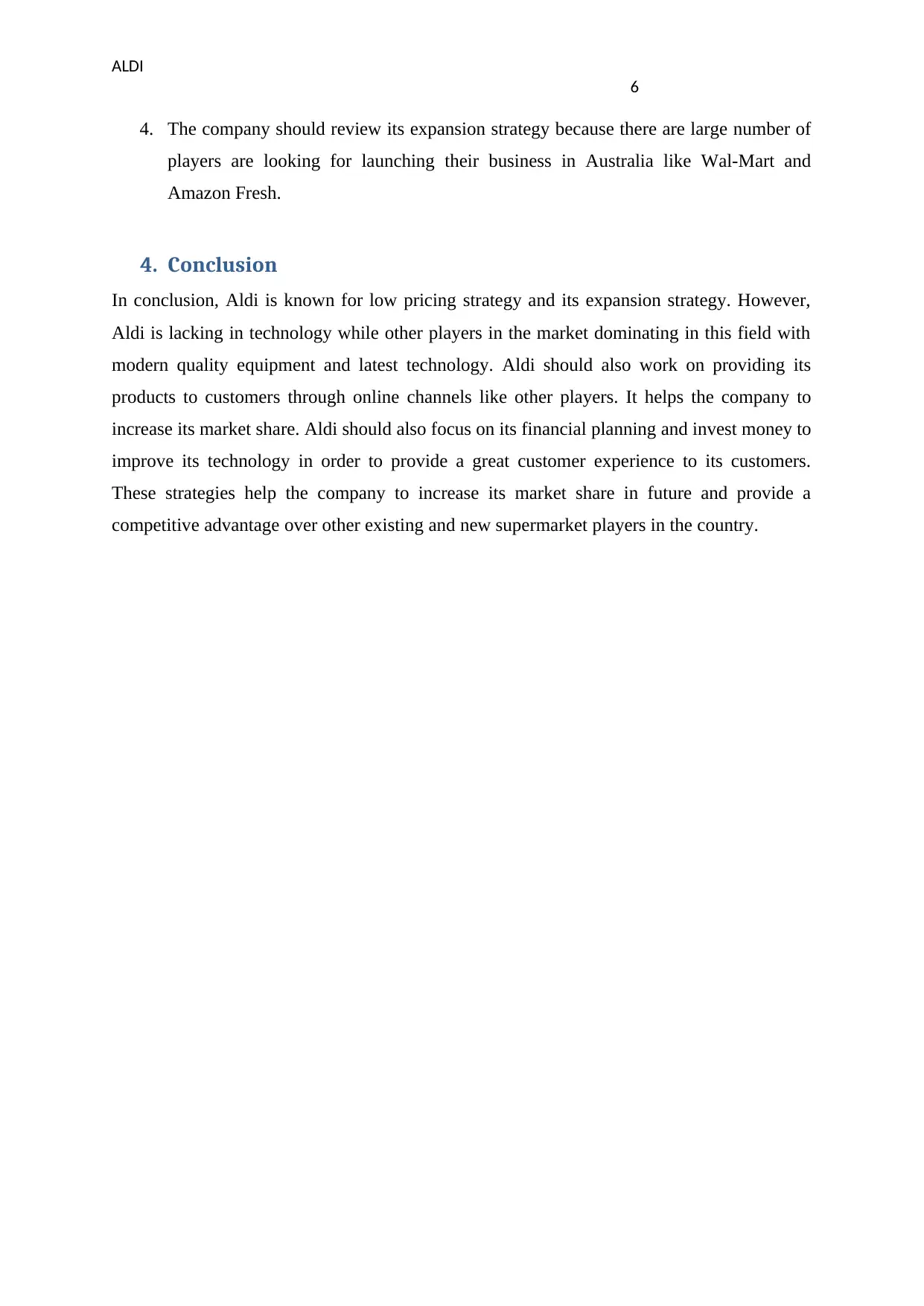
ALDI
6
4. The company should review its expansion strategy because there are large number of
players are looking for launching their business in Australia like Wal-Mart and
Amazon Fresh.
4. Conclusion
In conclusion, Aldi is known for low pricing strategy and its expansion strategy. However,
Aldi is lacking in technology while other players in the market dominating in this field with
modern quality equipment and latest technology. Aldi should also work on providing its
products to customers through online channels like other players. It helps the company to
increase its market share. Aldi should also focus on its financial planning and invest money to
improve its technology in order to provide a great customer experience to its customers.
These strategies help the company to increase its market share in future and provide a
competitive advantage over other existing and new supermarket players in the country.
6
4. The company should review its expansion strategy because there are large number of
players are looking for launching their business in Australia like Wal-Mart and
Amazon Fresh.
4. Conclusion
In conclusion, Aldi is known for low pricing strategy and its expansion strategy. However,
Aldi is lacking in technology while other players in the market dominating in this field with
modern quality equipment and latest technology. Aldi should also work on providing its
products to customers through online channels like other players. It helps the company to
increase its market share. Aldi should also focus on its financial planning and invest money to
improve its technology in order to provide a great customer experience to its customers.
These strategies help the company to increase its market share in future and provide a
competitive advantage over other existing and new supermarket players in the country.
Paraphrase This Document
Need a fresh take? Get an instant paraphrase of this document with our AI Paraphraser
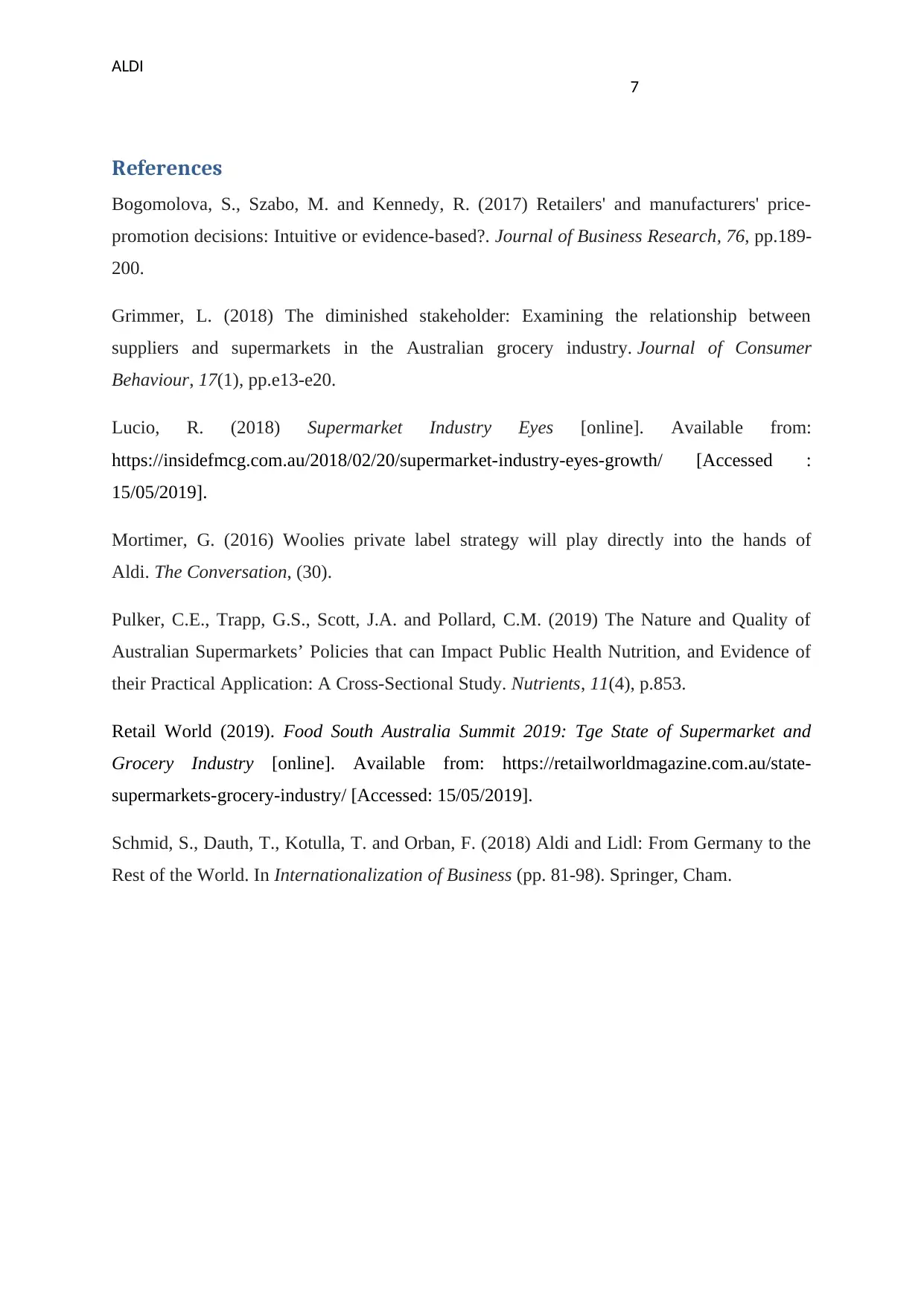
ALDI
7
References
Bogomolova, S., Szabo, M. and Kennedy, R. (2017) Retailers' and manufacturers' price-
promotion decisions: Intuitive or evidence-based?. Journal of Business Research, 76, pp.189-
200.
Grimmer, L. (2018) The diminished stakeholder: Examining the relationship between
suppliers and supermarkets in the Australian grocery industry. Journal of Consumer
Behaviour, 17(1), pp.e13-e20.
Lucio, R. (2018) Supermarket Industry Eyes [online]. Available from:
https://insidefmcg.com.au/2018/02/20/supermarket-industry-eyes-growth/ [Accessed :
15/05/2019].
Mortimer, G. (2016) Woolies private label strategy will play directly into the hands of
Aldi. The Conversation, (30).
Pulker, C.E., Trapp, G.S., Scott, J.A. and Pollard, C.M. (2019) The Nature and Quality of
Australian Supermarkets’ Policies that can Impact Public Health Nutrition, and Evidence of
their Practical Application: A Cross-Sectional Study. Nutrients, 11(4), p.853.
Retail World (2019). Food South Australia Summit 2019: Tge State of Supermarket and
Grocery Industry [online]. Available from: https://retailworldmagazine.com.au/state-
supermarkets-grocery-industry/ [Accessed: 15/05/2019].
Schmid, S., Dauth, T., Kotulla, T. and Orban, F. (2018) Aldi and Lidl: From Germany to the
Rest of the World. In Internationalization of Business (pp. 81-98). Springer, Cham.
7
References
Bogomolova, S., Szabo, M. and Kennedy, R. (2017) Retailers' and manufacturers' price-
promotion decisions: Intuitive or evidence-based?. Journal of Business Research, 76, pp.189-
200.
Grimmer, L. (2018) The diminished stakeholder: Examining the relationship between
suppliers and supermarkets in the Australian grocery industry. Journal of Consumer
Behaviour, 17(1), pp.e13-e20.
Lucio, R. (2018) Supermarket Industry Eyes [online]. Available from:
https://insidefmcg.com.au/2018/02/20/supermarket-industry-eyes-growth/ [Accessed :
15/05/2019].
Mortimer, G. (2016) Woolies private label strategy will play directly into the hands of
Aldi. The Conversation, (30).
Pulker, C.E., Trapp, G.S., Scott, J.A. and Pollard, C.M. (2019) The Nature and Quality of
Australian Supermarkets’ Policies that can Impact Public Health Nutrition, and Evidence of
their Practical Application: A Cross-Sectional Study. Nutrients, 11(4), p.853.
Retail World (2019). Food South Australia Summit 2019: Tge State of Supermarket and
Grocery Industry [online]. Available from: https://retailworldmagazine.com.au/state-
supermarkets-grocery-industry/ [Accessed: 15/05/2019].
Schmid, S., Dauth, T., Kotulla, T. and Orban, F. (2018) Aldi and Lidl: From Germany to the
Rest of the World. In Internationalization of Business (pp. 81-98). Springer, Cham.

ALDI
8
8
⊘ This is a preview!⊘
Do you want full access?
Subscribe today to unlock all pages.

Trusted by 1+ million students worldwide
1 out of 9
Related Documents
Your All-in-One AI-Powered Toolkit for Academic Success.
+13062052269
info@desklib.com
Available 24*7 on WhatsApp / Email
![[object Object]](/_next/static/media/star-bottom.7253800d.svg)
Unlock your academic potential
Copyright © 2020–2026 A2Z Services. All Rights Reserved. Developed and managed by ZUCOL.





